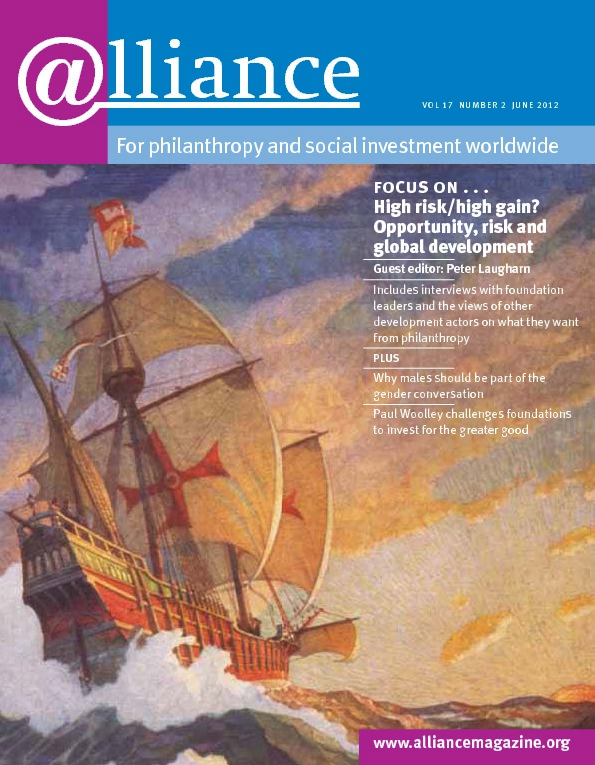 You can read Peter Grant’s book as a series of university lectures on the trade of giving or you can use it – the author suggests both options – as a reference book in the day-to-day work of a grantmaker. This is definitely how I will use it. It will be added to a collection of titles that I need frequently in my work, such as Joel Orosz’s The Insider’s Guide to Grantmaking – a book Grant refers to several times – or Gregor von Schnurbein and Karsten Timmer’s management handbook for grantmaking foundations Die Förderstiftung: Strategie – Führung – Management.
You can read Peter Grant’s book as a series of university lectures on the trade of giving or you can use it – the author suggests both options – as a reference book in the day-to-day work of a grantmaker. This is definitely how I will use it. It will be added to a collection of titles that I need frequently in my work, such as Joel Orosz’s The Insider’s Guide to Grantmaking – a book Grant refers to several times – or Gregor von Schnurbein and Karsten Timmer’s management handbook for grantmaking foundations Die Förderstiftung: Strategie – Führung – Management.
The Business of Giving, as the title already implies, considers social investing, giving or grantmaking as a profession. It is a solid contribution to the professionalization of the field. Grant starts out with ‘A Short History of Philanthropy’ (Chapter 2), defines giving as a business process (1 Risk Management, 2 Operations Management, 3 Performance Management) and then explores the actual management of social investments. He steers the reader through a variety of opinions and schools of thought on all these issues.
As an academic or student you will enjoy the fact that Grant explores the theory around the management of giving. In the chapter ‘Types and Styles of Social Investment’, you will find an in-depth discussion of how donors and their various strategies of giving can be classified. This discussion includes recent trends in the world of social investment such as social impact bonds and impact investing. Another example of this kind of exploration is the chapter on performance management. It includes a concise tour de raison of the various ways of measuring impact, their advantages and disadvantages.
As a grant manager in a large foundation, a social investment fund or a government agency, you will especially appreciate the four chapters on the actual management of social investments. First, the author shows how complex the actual work on the ground of grantmakers can be. You will find many arguments as to why a professionalization of the field is good. Second, he describes the various tools that can be used in these processes. Some of the checklists – for instance for annual review telephone interviews with grantees – can be used right away.
All readers will enjoy the clear structure of each chapter in the tradition of business management books. At the beginning of each chapter, the author describes its aim. He ends each chapter with a section on other literature the reader should explore to deepen their understanding of the topic.
Peter Grant, who is a Senior Fellow in Philanthropy, Grantmaking and Social Investment at the Sir John Cass Business School, and has worked for UK-based grantmakers like Sport England and the Big Lottery Fund, moves easily between academia and practice. The balancing act between these two worlds works most of the time for the reader but does split the book very much into two parts: theory and practice. As a reader, I wonder why some of the management theories are not explored and explained with the help of case studies. The author mentions examples of his own work in the field and must have access to many more such examples. The book thus misses out on the opportunity to bring to life the various management practices the author describes.
For instance, he emphasizes the importance of risk management in grantmaking and introduces a clearly defined way of doing this. I agree with the author that risk is one of the key factors to consider in grant management. But risk in giving is not just a tool, it is also a value. In the third sector, grantmakers are often seen as rather risk-averse, going for the safe bets. The exploration of these nuances in the business of giving can often best be done by telling stories.
Peter Grant’s book does fill a gap in the world of giving. It also eschews one thing that most donors base their giving on: passion. The book is factual, it is analytical, and it is to the point. It is not inspirational, breathtaking and strident, as so many other books we have seen in the last couple of years on the issue of giving have been. It is all the better for it.
Michael Alberg-Seberich is managing partner at Active Philanthropy. Email alberg-seberich@activephilanthropy.org
To order
http://www.palgrave.com
The Business of Giving: The theory and practice of philanthropy, grantmaking and social investment
Peter Grant Cass Business Press £26
ISBN 9780230336797


Comments (0)